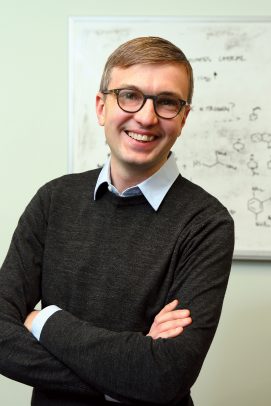Designing a new class of prescription drugs
Terry Moore is a medicinal chemist focused on discovering new drugs to improve the lives of men and women living with chronic health conditions, like cancer and diabetes.
Unlike many drug discovery labs, Moore’s lab investigates the way that proteins interact with one another in diseases.
“Proteins interact over large surface areas, usually much larger than the interactions of proteins and small molecule drugs, like statins or corticosteroids,” said Moore, assistant professor of medicinal chemistry in the UIC College of Pharmacy. “This makes these protein-
protein interactions more difficult to target.”
While protein-protein interactions may be more challenging drug targets, “they are ubiquitous throughout the cell, and targeting them may be more impactful if we can develop ways to manipulate their activity,” Moore said, “especially when it comes to conditions that lack adequate pharmaceutical treatment options or for conditions that are known to become resistant to small molecule drug therapies.”
For example, Moore’s lab is investigating a protein-protein interaction to treat estrogen receptor-positive breast cancer.
“Estrogen receptor-positive breast cancer is known to become resistant to the endocrine therapy drugs currently used, like tamoxifen,” Moore said. “When that happens, physicians have very few treatment options left to offer patients.
“Our approach targets a different surface of the estrogen receptor with a novel design strategy,” said Moore, whose lab has created a series of new “stapled peptides.” The stapled molecular structure causes these peptides to degrade at slower rates, not unlike many small molecules, and more easily permeate the cell to affect the function of the estrogen receptor.
“Because the mechanism we’re investigating works differently than the small molecule mechanism, they may be successful when treatments with small molecule drugs have failed,” Moore said.
Already, the stapled peptides have worked in biochemical models. Moore and his collaborators are now studying inhibition of estrogen receptor-positive breast cancer growth using stapled peptides in vitro — in petri dish cells.
Moore and his collaborators are also studying another protein in vivo — in living organisms. This protein, called Nrf2, controls expression of protective enzymes of cells and is an important drug target for many different conditions; Moore is investigating ways to activate Nrf2 for chronic wound healing.
“Chronic, non-healing wounds of the skin are serious medical complications that affect over 6.5 million Americans,” Moore said. “While there are surgical and topical treatments for these wounds, which include pressure sores and diabetic foot ulcers, there are almost no pharmaceutical therapies, and the high number of lower-limb amputations each year arising from these wounds provides undeniable evidence that new treatments are needed.”
Moore hopes that, by studying protein-protein interactions and developing the tools needed to harness their therapeutic potential, his lab will pave the way for the development of a new class of drugs.
“We want to create something new,” Moore said. “Something that may help people.”
Moore’s research has been published in nearly 30 peer-reviewed journals, including the high impact factor journal, Angewandte Chemie International Edition.
In addition to his appointment in the UIC College of Pharmacy, Moore is also a member of the UIC Collaborative Engagement in Novel Therapeutic Research and Enterprise (UIC Centre) and the University of Illinois Cancer Center.
Moore received his bachelor’s degree in biochemistry from Abilene Christian University and his Ph.D. in chemistry from the University of Illinois at Urbana-Champaign. He was a post-doctoral researcher at the University of Illinois and Emory University before joining the faculty at UIC.

